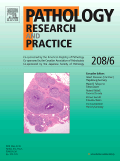
PATHOLOGY RESEARCH AND PRACTICE
Scope & Guideline
Exploring the Depths of Pathology and Forensic Medicine
Introduction
Aims and Scopes
- Molecular Pathology:
Research exploring the molecular mechanisms underlying diseases, including cancer genomics, epigenetics, and the role of non-coding RNAs in tumor progression. - Histopathological Studies:
Detailed examinations of tissue specimens to identify disease patterns, tumor characteristics, and their correlation with clinical outcomes. - Diagnostic Innovations:
Development and validation of novel biomarkers and diagnostic techniques, including immunohistochemical markers and next-generation sequencing applications. - Cancer Immunology:
Studies focused on the tumor microenvironment, immune evasion mechanisms, and the role of immune checkpoints in cancer progression and therapy. - Therapeutic Research:
Research on therapeutic targets, including drug resistance mechanisms, and the potential of novel treatment modalities such as immunotherapy and gene therapy.
Trending and Emerging
- Role of Non-coding RNAs:
Increasing research on non-coding RNAs, particularly their roles in cancer progression, chemoresistance, and as potential therapeutic targets, showcases the expanding understanding of RNA biology in pathology. - Tumor Microenvironment Studies:
A growing emphasis on the tumor microenvironment, including interactions between cancer cells and stromal components, is evident, highlighting its significance in cancer biology and treatment responses. - Artificial Intelligence and Digital Pathology:
The integration of artificial intelligence and machine learning techniques in pathology for diagnostic purposes is a rapidly emerging theme, showcasing the potential for enhanced accuracy and efficiency in diagnostics. - Immunotherapy and Cancer Treatment:
Research focusing on immunotherapeutic strategies, including the exploration of immune checkpoint inhibitors and their roles in various cancers, is gaining momentum, reflecting a significant shift in cancer treatment paradigms. - Personalized Medicine Approaches:
Emerging studies on personalized medicine in pathology, particularly the use of genetic and epigenetic profiling to tailor treatments, are becoming increasingly prevalent.
Declining or Waning
- Traditional Histopathology Techniques:
There has been a noticeable decrease in studies emphasizing traditional histopathological techniques without molecular or genetic components, as the field moves towards more integrative approaches that combine histology with molecular data. - Single Disease Focus:
Research centered exclusively on individual diseases without consideration of broader implications or multi-disease comparisons is becoming less common, as interdisciplinary studies gain traction. - Basic Pathophysiology Studies:
Papers focusing solely on basic pathophysiological mechanisms without direct clinical or therapeutic relevance are less frequently published, indicating a trend towards translational research.
Similar Journals
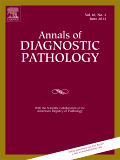
Annals of Diagnostic Pathology
Empowering Clinicians with Cutting-Edge Pathology Insights.Annals of Diagnostic Pathology, published by Elsevier Science Inc, is a pivotal journal in the field of diagnostic pathology that has significantly contributed to the advancement of medical science since its inception in 1997. With an ISSN of 1092-9134 and E-ISSN of 1532-8198, this esteemed journal is positioned within the Q2 category in both Medicine (miscellaneous) and Pathology and Forensic Medicine, reflecting its high-quality research contributions, showcased by its ranking at #73 out of 208 in Scopus for the latter category. The journal's scope encompasses various aspects of diagnostic pathology, from innovative techniques to critical reviews of pathologic findings, making it an essential resource for researchers, medical professionals, and students dedicated to enhancing diagnostic accuracy and patient care. Although it does not currently offer open access options, its wide readership and impactful publications continue to influence clinical practices and research agendas. With a convergence period extending to 2024, Annals of Diagnostic Pathology remains a leading platform for disseminating valuable knowledge in this dynamic field.

ENDOCRINE PATHOLOGY
Delivering Impactful Research for Better Patient OutcomesENDOCRINE PATHOLOGY is a premier journal published by HUMANA PRESS INC, dedicated to advancing the understanding of endocrine disorders through innovative research and clinical practices. With an impressive impact factor and consistently ranked in the Q1 quartile across multiple categories such as Endocrinology, Diabetes and Metabolism, as well as Pathology and Forensic Medicine, this journal serves as a pivotal resource for researchers and professionals in the field. The journal covers a broad spectrum of topics related to endocrine pathology, providing insights into mechanisms, diagnostics, and therapeutics that inform both clinical and laboratory practices. Although it does not offer open access, its rigorous peer-review process ensures the dissemination of high-quality, impactful research that shapes clinical strategies and enhances patient care. With distribution spanning from its inception in 1990 to 2024, ENDOCRINE PATHOLOGY stands at the forefront of endocrine research, making it an essential read for anyone involved in the study and treatment of endocrine disorders.

INTERNATIONAL JOURNAL OF EXPERIMENTAL PATHOLOGY
Advancing Knowledge in Experimental PathologyINTERNATIONAL JOURNAL OF EXPERIMENTAL PATHOLOGY, published by Wiley, is a leading peer-reviewed journal dedicated to the field of experimental pathology. With an ISSN of 0959-9673 and E-ISSN 1365-2613, the journal has been a vital resource for researchers and professionals since its inception in 1990, covering a broad spectrum of topics within pathology, cell biology, and molecular biology. The journal's relevancy is underscored by its Q2 ranking in Pathology and Forensic Medicine and Q3 rankings in both Cell Biology and Molecular Biology, as of 2023, reflecting its significant contribution to the scientific community. Although it does not currently offer open access options, readers can benefit from its insightful research articles and reviews that guide advancements in diagnostic pathology and therapeutic strategies. As the journal continues to evolve, it remains committed to facilitating the exchange of innovative ideas and findings that drive progress in experimental pathology and related fields, making it an indispensable platform for scientists, clinicians, and students alike.
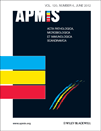
APMIS
Fostering Scientific Dialogue Across Multiple Medical DisciplinesAPMIS is a distinguished academic journal published by WILEY that serves as a vital resource for researchers and practitioners in the fields of Immunology, Allergy, Microbiology, and Pathology. Established in 1988 and continuing its mission through 2024, this journal facilitates the dissemination of high-quality research findings, contributing to the intersection of multiple disciplines within the medical sciences. With an ISSN of 0903-4641 and an E-ISSN of 1600-0463, APMIS is categorized in 2023's Q2 and Q3 quartiles across various domains, reflecting its significant impact, with rankings such as #50/208 in Pathology and Forensic Medicine and #121/233 in Immunology and Allergy. Although it currently does not offer open access options, the journal’s rigorous peer-review process ensures that published articles maintain the highest standards of scholarship. With its focus on innovative research, APMIS continues to occupy a pivotal role for those seeking to advance their expertise and contribute to scientific dialogue in these essential fields.
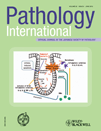
PATHOLOGY INTERNATIONAL
Elevating Research in Pathology and Forensic MedicinePATHOLOGY INTERNATIONAL, published by WILEY, stands as a distinguished journal in the field of pathology and forensic medicine, serving as an essential resource for researchers, clinicians, and students alike. With its ISSN 1320-5463 and E-ISSN 1440-1827, PATHOLOGY INTERNATIONAL has established itself since its inception in 1951, navigating through an evolving landscape in medical science with insights and breakthroughs up to 2024. It holds a commendable Q2 ranking in both the Medicine (miscellaneous) and Pathology and Forensic Medicine categories, indicating its robust influence and quality within these fields, as evidenced by its placement in the 70th percentile of Scopus rankings. While currently not an open-access journal, it provides access options that ensure valuable research remains available to the academic community. PATHOLOGY INTERNATIONAL commits to advancing the discipline through pioneering research articles, comprehensive reviews, and expert opinions that push the boundaries of understanding in pathology, thereby supporting the enhancement of diagnostic and therapeutic practices.
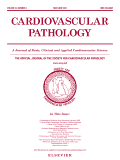
CARDIOVASCULAR PATHOLOGY
Championing discoveries in cardiovascular pathology.CARDIOVASCULAR PATHOLOGY, published by Elsevier Science Inc, is a distinguished journal dedicated to the dissemination of high-quality research in the fields of cardiology, pathology, and cardiovascular medicine. With an ISSN of 1054-8807 and an E-ISSN of 1879-1336, this journal has established itself as a vital resource for researchers, clinicians, and students alike. It is positioned in the Q2 quartile for both cardiology and pathology, indicating its significant impact and relevance in these disciplines. The journal offers a platform for innovative studies, reviews, and clinical insights, aiming to enhance our understanding of cardiovascular conditions and their pathological underpinnings. With an H-index that showcases its scholarly influence, CARDIOVASCULAR PATHOLOGY is committed to advancing the field through rigorous peer review and open dialogue among professionals. The journal is accessible through institutional subscriptions, making it an essential reference point for ongoing research through its convergence of knowledge from 1992 through 2024.
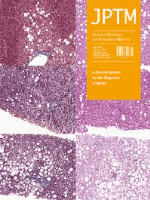
Journal of Pathology and Translational Medicine
Exploring Innovations in Clinical and Theoretical PathologyThe Journal of Pathology and Translational Medicine, published by the Korean Society of Pathologists, is a distinguished peer-reviewed Open Access journal that has been at the forefront of advancing the field of pathology and histology since its inception in 1985. With an established ISSN of 2383-7837 and an E-ISSN of 2383-7845, the journal serves as a vital platform for disseminating high-quality research, fostering collaboration among professionals and offering valuable insights into both clinical applications and theoretical advancements. Recognized for its influence in the field, it holds a commendable Q2 ranking in both Histology and Pathology & Forensic Medicine categories in 2023, and ranks #52/208 in Scopus for Medicine – Pathology and Forensic Medicine, demonstrating its impact and reach within the academic community. Located in South Korea at 1209 Gwanghwamun Officia, 92 Saemunan-ro, Jongno-gu, Seoul 03186, this journal not only caters to researchers and professionals but also supports students striving to deepen their understanding of pathology. Join the growing body of knowledge and stay updated with the latest findings in this essential field of study through the journal's open access format, promoting worldwide accessibility and engagement.
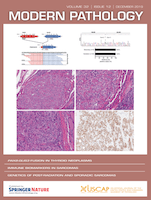
MODERN PATHOLOGY
Pioneering the Future of Diagnostic ScienceMODERN PATHOLOGY is a premier journal in the field of pathology and forensic medicine, published by Elsevier Science Inc. With an impressive impact factor that places it in the top 1st quartile (Q1) for 2023, and a remarkable rank of 5 out of 208 in its category according to Scopus, it serves as a vital resource for researchers, professionals, and students alike. Established in 1988, the journal focuses on the latest advancements in diagnostic pathology, molecular pathology, and related fields, providing a platform for innovative research that drives the discipline forward. Although it does not operate under an open access model, readers can expect rigorously peer-reviewed publications that contribute to the growing body of knowledge in pathology. With a continuous commitment to excellence and relevance, MODERN PATHOLOGY remains a fundamental avenue for disseminating high-quality scientific research globally, facilitating the growth and development of its field.

HISTOLOGY AND HISTOPATHOLOGY
Connecting Researchers to Groundbreaking DiscoveriesHISTOLOGY AND HISTOPATHOLOGY, published by F HERNANDEZ, is an esteemed academic journal dedicated to advancing the fields of histology and pathology. With its ISSN 0213-3911 and E-ISSN 1699-5848, this journal has been a crucial resource for researchers and professionals since its inception in 1986. The journal enjoys a strong reputation, evidenced by its Q2 category rankings in both Histology and Pathology & Forensic Medicine as of 2023, positioning it within the top tier of scholarly publications. With Scopus rankings placing it at Rank #74/208 in Medicine - Pathology and Forensic Medicine and Rank #31/62 in Medicine - Histology, it proves to be an essential platform for disseminating significant research findings and innovations. Although the journal is not open access, it is committed to providing high-quality, peer-reviewed articles that cater to the needs of its academic community. With a focus on fostering a deeper understanding of tissue structure and disease mechanisms, HISTOLOGY AND HISTOPATHOLOGY serves as an indispensable resource for students, researchers, and practitioners alike, facilitating the exchange of knowledge and pioneering research in these vital areas of study.
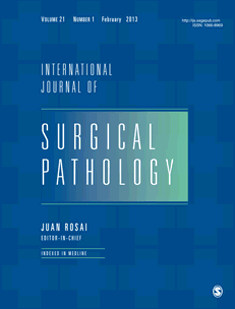
INTERNATIONAL JOURNAL OF SURGICAL PATHOLOGY
Bridging the Gap Between Research and PracticeInternational Journal of Surgical Pathology is a distinguished peer-reviewed journal published by SAGE Publications Inc since 1993, specializing in the intricate fields of surgical pathology, anatomy, and surgery. With an ISSN of 1066-8969 and an E-ISSN of 1940-2465, this journal has been at the forefront of disseminating vital research that helps shape clinical practices and understanding in surgical diagnostics. Ranked in the Q2 category for Anatomy and garnering Q3 status in Pathology and Forensic Medicine as well as Surgery, the journal holds a commendable position within its field as reflected by its Scopus ranks. The impact factor underscores its influence and relevance, making it an essential resource for researchers, professionals, and students alike, looking to stay abreast of advancements in surgical pathology. However, please note that the journal does not currently offer open access options. As it converges through the years from 1993 to 2024, the International Journal of Surgical Pathology continues to uphold its commitment to excellence in medical research.